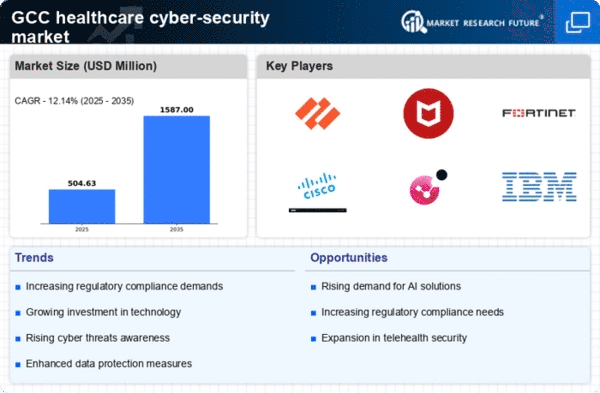Rising Cybersecurity Incidents
The healthcare cyber-security market is experiencing a notable increase in cyber incidents, which is driving demand for robust security solutions. In the GCC region, healthcare organizations have reported a surge in ransomware attacks and data breaches, prompting a reevaluation of their cybersecurity strategies. According to recent data, healthcare institutions in the GCC have faced a 30% rise in cyber threats over the past year. This alarming trend underscores the necessity for advanced cybersecurity measures to protect sensitive patient data and maintain operational integrity. As a result, investments in cybersecurity technologies are expected to grow significantly, with the market projected to reach $1 billion by 2026. The urgency to address these threats is propelling the healthcare cyber-security market forward, as organizations seek to safeguard their digital assets and comply with regulatory requirements.
Growing Awareness of Data Privacy
The healthcare cyber-security market is witnessing a shift in focus towards data privacy, driven by increasing awareness among patients and healthcare providers. In the GCC, there is a rising demand for transparency regarding how personal health information is managed and protected. This heightened awareness is prompting healthcare organizations to prioritize data protection measures, leading to a surge in the adoption of cybersecurity solutions. Recent surveys indicate that 70% of patients in the GCC are concerned about the security of their health data, which is influencing healthcare providers to enhance their cybersecurity frameworks. As a result, The healthcare cyber-security market is likely to see a significant uptick in demand for solutions that ensure compliance with data protection regulations. This will foster trust among patients.. This trend highlights the critical role of cybersecurity in maintaining patient confidence and safeguarding sensitive information.
Regulatory Pressure for Compliance
The healthcare cyber-security market is increasingly influenced by regulatory pressures aimed at ensuring compliance with data protection laws. In the GCC, governments are implementing stricter regulations to safeguard patient information and enhance cybersecurity measures within healthcare organizations. This regulatory landscape is compelling healthcare providers to invest in comprehensive cybersecurity solutions to avoid potential penalties and reputational damage. Recent reports suggest that non-compliance can result in fines of up to $500,000, which is a significant motivator for organizations to bolster their cybersecurity frameworks. As regulatory requirements evolve, the healthcare cyber-security market is expected to grow as organizations seek to align their practices with legal standards. This trend indicates a proactive approach to cybersecurity, where compliance is not merely a legal obligation but a strategic imperative for healthcare organizations.
Increased Investment in Digital Health
The healthcare cyber-security market is benefiting from the growing investment in digital health technologies across the GCC. As healthcare providers increasingly adopt telemedicine, electronic health records, and mobile health applications, the need for enhanced cybersecurity measures becomes paramount. The GCC region has seen a 25% increase in digital health investments in the last year, which correlates with a heightened focus on securing these digital platforms. This trend indicates that healthcare organizations are recognizing the importance of integrating cybersecurity into their digital transformation strategies. Consequently, the healthcare cyber-security market is likely to expand as organizations allocate more resources to protect their digital health initiatives. The convergence of digital health and cybersecurity is expected to create new opportunities for vendors offering innovative solutions tailored to the unique challenges of the healthcare sector.
Emergence of Advanced Cybersecurity Technologies
The healthcare cyber-security market is being transformed by the emergence of advanced cybersecurity technologies, which are essential for combating sophisticated cyber threats. In the GCC, organizations are increasingly adopting artificial intelligence, machine learning, and blockchain technologies to enhance their cybersecurity posture. These innovations enable healthcare providers to detect and respond to threats in real-time, thereby minimizing the risk of data breaches. The market for these advanced solutions is projected to grow by 40% over the next five years, reflecting the urgent need for healthcare organizations to stay ahead of evolving cyber threats. As the landscape of cyber threats becomes more complex, the integration of cutting-edge technologies into cybersecurity strategies is likely to become a defining characteristic of the healthcare cyber-security market.

















